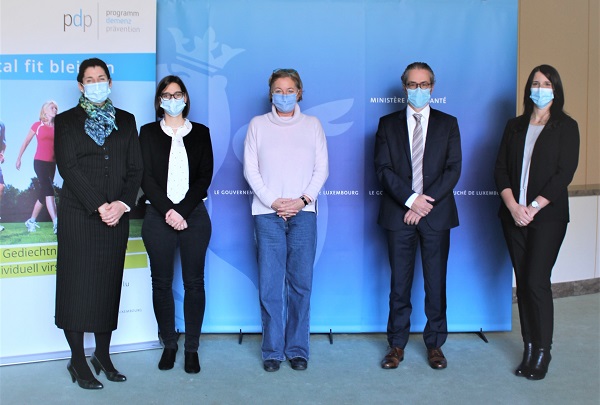 L-R: Deborah McIntyre, neurologist; Anne Kaysen, project manager; Paulette Lenert, Minister of Health; Prof. Rejko Krüger, pdp coordinator; Valerie Schröder, memory coach;
Credit: MSAN
L-R: Deborah McIntyre, neurologist; Anne Kaysen, project manager; Paulette Lenert, Minister of Health; Prof. Rejko Krüger, pdp coordinator; Valerie Schröder, memory coach;
Credit: MSAN
The Luxembourg Programme for Dementia Prevention (pdp) has announced plans to expand its team and services in an effort to reach more people with mild cognitive impairment in the Grand Duchy.
As it enters a new funding period, the pdp will continue to develop in the direction of personalised prevention and help to reduce the risk of dementia in Luxembourg for people with mild cognitive impairment (MCI). MCI is a slight decrease in the performance of the brain that can lead to dementia in its further course. In pdp, risk factors are specifically targeted in people with MCI, thus significantly reducing the likelihood of developing dementia.
Luxembourg's Minister of Health Paulette Lenert explained: "With the new phase of pdp we want to intensify our efforts to reach even more people with MCI in Luxembourg and offer more targeted measures for dementia prevention". To this end, both the pdp team and the services offered for people with MCI will now be expanded. In addition, the accompanying research is being intensified to identify additional risk factors, which could lead to more personalised preventive measures.
With life expectancy in Luxembourg and Europe increasing statistically, so too does the risk of developing dementia in old age. The aim of the pdp is to reduce this risk in as many people as possible. The programme is based on recent scientific findings in which researchers have identified a dozen risk factors that can be influenced in a targeted manner to prevent or delay dementia. These findings led Luxembourg's Ministry of Health, in cooperation with the Luxembourg Centre for Systems Biomedicine (LCSB) of the University of Luxembourg, to significantly increase the measures for dementia prevention through pdp in 2018.
People who are suspected of having MCI and who show evidence of increased risk factors can be referred to the programme by their treating physician. Participants are then carefully examined in pdp to record their lifestyle habits and to create a cognitive profile based on memory, attention and language tests. This procedure determines an individual risk profile for each patient. Based on the risk profile, pdp then suggest free personalised preventive measures.
The basis for the programme's success is the close cooperation with the treating physicians and health service providers in Luxembourg.
To support even more people in the fight against dementia, the pdp team and its network will be expanded in the new funding period of the programme.
The Health Minister added: “We want as many people as possible in Luxembourg to benefit from pdp”. For this reason, there are now contact points for pdp not only in Luxembourg City, but also in Ettelbrück and Esch-Belval.
In addition, digital offers will be developed as part of the programme. Rejko Krüger, Professor of Neuroscience and coordinator of pdp, commented: "With digital offers, we will be able to reach even more people, especially those who are currently holding back and prefer staying in their homes".
The initiators of pdp have already developed the programme in the direction of a personalised prevention concept and they will now also accompany the measures with a new research project in Luxembourg:
"We would like to investigate how the social environment, socio-economic factors, diet and the composition of microbes in the digestive tract influence the risk factors," explained Prof. Krüger. "Thereby we are aiming to identify further dementia risk factors, which we can then specifically address and reduce within the framework of pdp”. This is not only intended to reach more people, but also to continuously improve the quality of their treatment.








